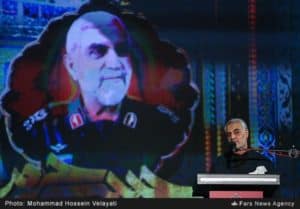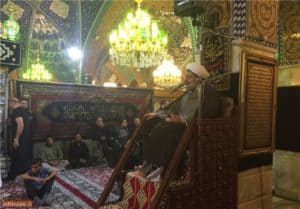
Qassem Soleimani addressing the crowd.
The top commander and clerical representative of the Islamic Revolutionary Guard Corps’ (IRGC) external operations wing, the Qods Force, recently delivered speeches in Tehran and Damascus commemorating the first anniversary of the death of Brigadier General Hossein Hamedani, the most senior IRGC commander killed in the Syrian civil war.
IRGC-QF commander Major General Qassem Soleimani delivered a speech on Oct. 5 in Tehran. Senior IRGC commanders and Iranian government officials were in attendance.
“The problem of the enemies is the centrality of Syria in the resistance front and relations with the Islamic Republic,” Soleimani said. “We do not only defend Syria in this country, but we defend Islam and the Islamic Republic of Iran, as well, because DAESH [pejorative for the Islamic State] and takfiri groups were not formed for Syria, these were formed for Iran.”
Soleimani’s statement underscores the strategic importance of Syria to Tehran. He and other senior officials justify their involvement in Syria by claiming that the fight there keeps Iran safe from threats like the Islamic State and Sunni extremists.
Soleimani said he saw Hamedani a few hours prior to his death and suspected Hamedani sensed his demise. Hamedani, who was posthumously promoted to Major General, played an important role in the IRGC’s Syria operations until his death on Oct. 7, 2015, in the vicinity of Aleppo.
He was a top commander in the Iran-Iraq War and led the crackdown against Iranian protesters in Tehran during the 2009 post-election protests. Deploying to Syria in 2011 shortly after the protests broke out, Hamedani was in charge of organizing Syrian paramilitary forces based on Iran’s Basij model, and was also the senior field commander in charged of IRGC and non-Iranian Shiite militias in Syria.
“The culture of Imam Hussein has made us victorious,” Soleimani said. “[If a] DAESH government would have formed, God knows what disasters would have occurred in the world of Islam. The Islamic Republic of Iran has stood against this disaster with pride.”
“The Syrian system has been able to tolerate five years of pressure and surrounding with Iran’s help, so the world confesses that these groups are terrorists … If these groups were not stopped in Syria, today all of this region would be fighting DAESH.”
Soleimani then claimed the Islamic State is “worse than the Khawarij,” or the group that broke away from Imam Ali, who was the successor of Muhammad in the seventh century, point out to “what they do with prisoners.”
“The takfiris have been or are being defeated in all fronts today,” Soleimani said. “I believe that the Syrian people are undefeatable with the support of their government. Europe today pays a heavy security price, and the reason is their support of these terrorist groups. Martyr Hamedani had a valuable effect on these victories.”
“We must trust the wisdom of our leader [Ali Khamenei], and know his value. Today if the Islamic Revolution has amazed the enemies it is because the wisdom of the leader … We are proud that we are Shia, whose peak is higher than all religions.”
Meanwhile, in Damascus, the supreme leader’s clerical representative in the Qods Force, Ali Shirazi, delivered remarks for a commemoration ceremony held for Hamedani in the Mosque of Sayeda Roqayyah in Damascus, Syria.

Ali Shirazi delivering remarks.
The press reported that “shrine defenders” from Lebanon, Pakistan, Iraq, Afghanistan, and Iran attended the ceremony. Iranian embassy staff in Syria including the ambassador were also in attendance. The governor of Iran’s Khorasan-e Razavi province, where the holy city of Mashhad is located, was also there.
Hojjat al Eslam Ali Shirazi said “if Muslim nations were not silent against their corrupt rulers, there would be no need today for all of these martyrs.”
“The reason is that humans are silent against oppressors and the deviation of global community,” Shirazi said. “They neither have problem in the heart nor protest on the tongue. Jihad against the enemies continues until they cease hostility with God’s religion and all Islamic communities move according to God’s commandments.”
[Update: In the earlier version of this report, the name of the IRGC command post in Syria was listed as the Imam Hossein Base. This is unconfirmed. There is the a distinct Imam Hossein Base of the IRGC Basij paramilitary headquartered in Iran, which has deployed forces to Syria.]








2 Comments
To infer such nonsense, who would want such a thing? I doubt the west could conceive a plan so complex. Kasi kasem should pay more attention to his allies who feel the Iranians are in the rear getting shoe shines and saluting each other.
Is it possible that General Soleimani misses the strength of Wahhabi hatred for the Alawite, who incorporate elements of Christianity and Judaism and prefer Ottoman Kanun law to Sharia?
Plus that in an era of declining oil revenues and falling incomes in the Gulf States these Bedouins of Arabia had to know that Syria had modernized its economy. Syria did what KSA could not do.
Family income in Syria rose by three to one over the 20 years prior to the foreign interventions beginning 2011 that produced Islamic State, Nusrah, and the newly wealthy Muslim Brotherhood in Syria.
Is Soleimani correct: “We do not only defend Syria in this country, but we defend Islam and the Islamic Republic of Iran, as well, because DAESH and takfiri groups were not formed for Syria, these were formed for Iran” ??? Probably not. The hundreds of million of dollars invested to arm and man DAESH were aimed first to destroy the Alawite. Geographically the whole of northern and Kurdish Iraq stands between the Islamic State and Iran. And ultimately so far as I can tell there is no substantial industrial base in Syria capable of challenging Iran’s military. But it’s a good budget argument. “The next two or three years will be critical….”